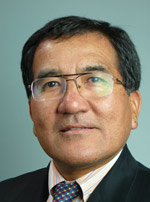Glencore, Peru: Gain the Edge - Fidel Kishimoto
The benefits of executive education are applicable to any stage of an executive’s career. Fidel Kishimoto, director of Glencore, Peru, tells Steve Coomber how education programmes have proven vital in shaping his professional future.
Executive education is sometimes viewed solely as a career development tool. While there is no doubt it plays an important role in executive talent management and development, it also offers benefits to executives no matter what stage of their career they are at.
For Fidel Kishimoto, general manager and director of Glencore, Peru, it is an important part of the management learning and development process and can even help those looking to progress from general management.
‘Executives operating in today's business world must remember that they need the knowledge and skills to develop their business under current market conditions, as well as the ability to develop and maintain global relationships,’ he says.
The economic events of the last two years have demonstrated that we live in a fast-paced, dynamic, rapidly changing world. This means that managers need to keep up to date with management practices and market trends, so they can react quickly when the occasion demands it.
Kishimoto recently participated in the Global CEO Program for Latin America (GCLA), run in partnership by IESE Business School, Madrid, Spain, the Wharton School, Philadelphia, US, and the China Europe International Business School (CEIBS), Shanghai, China.
For Kishimoto, a key aspect of the education programme was that it was structured in a way that made it comparatively easy to attend, even for busy senior executives. ‘The flexibility of having three different sessions roughly three weeks apart, and each in a different location, allowed me to organise my schedule in a way that made it possible to fit the courses in,’ he says.
For example, the GCLA programme, which is designed to address the specific needs and interests of CEOs and senior-business leaders in Latin America, consists of three one-week residential modules, held at IESE Business School, the Wharton School and CEIBS. Participants work individually and in teams, covering subjects such as global strategy and scenario planning, entrepreneurial management, and joint ventures and strategic alliances, delivered by management leaders.
As well as analysing business cases, participants also produce an individual project related to their management role. For Kishimoto, the interaction with other programme participants was particularly rewarding, something the executives that attend similar programmes tend to highlight. He also notes that the experience proved useful in terms of personal development and helped prepare him to move on from his general management role.
‘Executive education was effective for my personal development because it allowed me to incorporate new trends and frameworks into my business activities,’ Kishimoto says.
‘Listening to and talking with the other executives on the programme helped me recognise business opportunities and identify new planning methods that I could apply. You can learn a lot from people who work in different sectors and markets.’
A significant aspect of executive education is the ability to apply the learning on the programme directly to work-related issues. Kishimoto used his project to develop his and his employer's succession planning processes. Anticipating a time in the near future where he would step back from his day-to-day general management role, while maintaining his work as board director, Kishimoto used his personal project to devise a coaching and a mentoring programme that would help him prepare a junior executive to fill his position.
Kishimoto says he is fortunate enough to work for an organisation that places an emphasis on continued education. But does he believe that executive education will become more widespread, and is it something he would recommend to other executives?
‘Glencore is very concerned about the education of its executives and has a strong training and education programme,’ says Kishimoto.
‘Of course, each organisation has its own view on learning and development, but I do think that organisations are increasingly placing greater emphasis on executive education. Certainly, from my personal experience, I found it very valuable and have recommended it to many of my circle of contacts.’

